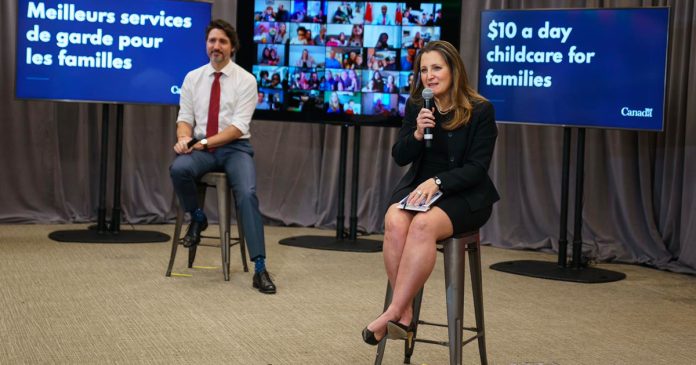In both Canada and the United States, the federal government spent a massive amount of money during Covid. A significant portion of this money was mismanaged, poorly targeted, wasteful or simply excessive. And taxpayers in both countries will bear the cost of this fiscal waste for years to come.
In Canada, the largest federal government programs were the Canada Emergency Wage Subsidy (CEWS), which cost $100.7 billion, and the Canada Emergency Response Benefit (CERB) and its successor, the Canada Recovery Benefit (CRB), which totalled $100.4 billion.
There were several problems with the design of these programs. For instance, money was provided to individuals and businesses that were not in genuine need, and excessive amounts of support went above what was required to stabilize income for Canadians affected by Covid restrictions.
For instance, according to a report by the auditor general (AG), the government paid $4.6 billion in CERB and other benefits to ineligible Canadians. The AG also recommended that the government investigate the nature of another $27.4 billion in Covid spending. Overpayment recipients included 1,522 prisoners, 391 dead people and 434 children too young to be eligible. Finally, the AG found that 51,049 employers, who received $9.9 billion in CEWS payments, did not demonstrate a sufficient revenue drop to be eligible for the subsidy.
A similar story emerged with our southern neighbours. For instance, during the pandemic, the U.S. federal government enacted the Paycheck Protection Program (PPP), which provided an estimated $800 billion in payroll funds for small businesses, and Economic Impact Payments (i.e. stimulus payments) estimated at $814 billion.
According to independent analyses, these programs were also poorly designed, excessive and largely ineffective. The Office of Inspector General (OIG) estimated that at least 21.5% of unemployment payments—one in five—were “improper” and cost at least $191 billion.
Another study found that between $335 billion and $395 billion of the $510 billion distributed over the first two phases of the PPP in 2020—equivalent to 66 to 77% of the money—didn’t go towards paycheques but rather to businessowners, shareholders, creditors and others. And that about three-quarters (72%) of PPP benefits went to Americans in the top 20% of household income.
Now, according to a new analysis on Covid spending published by the Fraser Institute, Canada’s federal government spent $359.7 billion while the U.S. federal government spent $5.1 trillion. In both cases, each country financed this spending entirely through borrowing.
The analysis estimates both countries wasted at least 25% of their total Covid spending—$89.9 billion in Canada and $1.3 trillion in America.
As the spending was financed by borrowing, taxpayers in each country will pay higher debt interest costs moving forward. Specifically, over the next 10 years, Canadians will pay an estimated $21.1 billion in interest costs attributable to Covid fiscal waste. Consequently, the total cost of Canada’s Covid fiscal waste will reach an estimated $111.0 billion by the end of 2032/33.
During the same 10-year span, Americans will pay approximately $289.4 billion in federal debt interest payments due to Covid waste, which brings the total cost of COVID fiscal waste to more than $1.56 trillion.
Even though the pandemic has ended, the ongoing costs of wasteful Covid spending are far from over, with Canadian and American taxpayers paying the bill.
Jake Fuss and Tegan Hill are economists at the Fraser Institute.





















